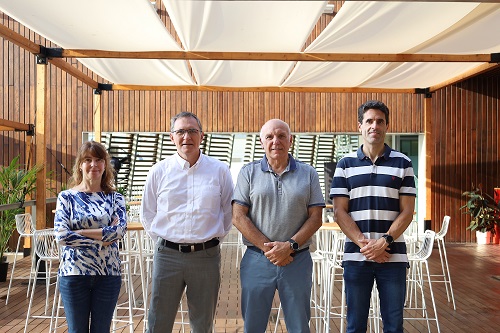
September 20th, 2024 - Press notes
The oxidation of low-density lipoproteins present in the blood (LDL) or bad cholesterol opens the door to an increased cardiovascular risk, as this oxidized cholesterol is more likely to deposit in the arteries, leading to the growth of cholesterol plaques that cause arteriosclerosis.
Engaging in intense physical activity reduces the oxidation of LDL particles, lowering the risk of cardiovascular disease. Thirty minutes of intense exercise daily reduces oxidized LDL cholesterol by 8 to 10%. However, the effect is only seen in men. Low or moderate intensity exercises do not have the same effect.
This is revealed by a study from the Hospital del Mar Research Institute and the Faculty of Medicine of the University of Vic-Central University of Catalonia, published in the Spanish Journal of Cardiology.
A study by a team of researchers from the Hospital del Mar Research Institute, the University of Vic-Central University of Catalonia (UVic-UCC), the CIBER of Obesity and Nutrition Physiology (CIBEROBN), and the CIBER of Cardiovascular Diseases (CIBERCV), using data from the REGICOR study (Gironí Heart Registry), has revealed that engaging in intense physical activity reduces the levels of oxidation of LDL cholesterol present in the blood (low-density lipoproteins), the most harmful form of the so-called bad cholesterol. Thirty minutes of exercise a day results in an 8-10% reduction in oxidized LDL cholesterol. The results are published in the Revista Española de Cardiología.

Left to right, Montse Fitó, Roberto Elosua, Jaume Marrugat, Isaac Subirana
Dr. Roberto Elosua, coordinator of the Cardiovascular Epidemiology and Genetics Group at the Hospital del Mar Research Institute and dean of the Faculty of Medicine at UVic-UCC, points out that "we have seen that physical activity, especially intense physical activity, reduces levels of oxidized LDL. Thus, at equal levels of LDL, a person who engages in physical activity has a lower cardiovascular risk caused by bad cholesterol." The study suggests that this may be one of the mechanisms that explain the positive effect of physical exercise in preventing cardiovascular diseases. It is already known that physical activity lowers blood pressure and bad cholesterol levels while increasing good cholesterol, among other effects. However, these mechanisms do not explain the full beneficial effect of exercise. This study identifies a new pathway explaining why physical activity is beneficial to health.
The study followed 3,070 individuals from the REGICOR study, measuring their levels of LDL cholesterol oxidation. This process facilitates the deposition of cholesterol particles in the arteries and leads to the growth of plaques that cause arteriosclerosis. The physical activity levels of this population were also measured using a questionnaire. Thus, a strong relationship was established between engaging in intense physical activity (such as running, Nordic walking, or swimming) and the reduction of cholesterol oxidation. In contrast, low or moderate intensity physical exercise does not have the same positive effect.
One of the conclusions is that this positive effect is only seen in men. The researchers believe that the fact that women do not benefit from this effect may be related to hormonal differences between the sexes, with estrogen acting as a protector against lipid oxidation, but other reasons are not ruled out. They also propose several mechanisms as factors causing the reduction in the oxidation of bad cholesterol, such as a decrease in the presence of LDL cholesterol particles in the blood.
This study was supported by the Carlos III Health Institute (ISCIII) and the European Regional Development Fund (CIBERCV-CIBEROBN), the University and Research Aid Management Agency (SLT002/16/00088), and the Government of Catalonia through the University and Research Aid Management Agency (2017SGR946).
Benet-Pozo R, Fitó M, Marrugat J, García-García C, Subirana I, Elosua R. Does the amount and intensity of physical activity matter for low-density lipoprotein oxidation? Rev Esp Cardiol (Engl Ed). 2024 Jul 8
(24)00209-3. English, Spanish. doi:10.1016/j.rec.2024.06.005. Epub ahead of print. PMID: 38986931.
Parc Salut Mar
Passeig Marítim 25-29 Barcelona 08003
See location on Google maps
Phone: 93 248 30 00 · Fax: 93 248 32 54
Information request
© 2006 - 2025 Hospital del Mar · Legal notice and Privacy Police | Cookie Policy | Accessibility